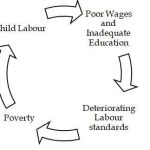
Directive Principles of State Policy
Introduction
- Ideals that State should keep in mind while formulating policies & enacting laws–‘Instrument of Instructions’ to State in L, E & A matters.
- DPSPs are the principles of Rajya Dharma.
- Based on Phil of Democratic Socialism
- Ambedkar—
- ‘Novel features’ of Indian Constitution.
- DPSPs along with FRs contain the philosophy of Constitution & is the soul of the Constitution.
- Granville Austin—
- DPSPs & FRs r the ‘Conscience of the Constitution’– They connect India’s future, present & past & are the Tools to realise aim of social revolution.
Origin
- Granville Austin—“DPSPs had their origins in INM, which strove to achieve social welfare as goal of independent Indian State.”
- Nehru Report.
- Sapru Report of 1945– Distinction b/w justiciable & Non-justiciable rights.
Features
- Constitute a very comprehensive S, E & P Prog for a modern democratic State.
- Aimed at realising high ideals of justice, liberty, equality & fraternity enshrined in Preamble.
- Embody the concept of a ‘welfare state’ & seek to est S & E democracy in India.
- Consists of the larger goal of Constitution– Egalitarian society while preserving Human Dignity
Criticisms of DPSPs
- Lack of Legal sanction— Nothing more than a set of “Moral precepts”
- KT Shah— “Pious superfluities” + compared them with bank cheque to be payable only when resources of bank permits
- TT Krishnamachari—“Dustbin of sentiments”
- Ivor Jennings— ‘Pious aspirations’.
- Constitutional Conflict — B/w Centre & states, Prez & PM, Governor & CM
K Santhanam— Centre can give directions to state to implementation of DPs, and in case of non-compliance, can dismiss state govt. (Destroys federal structure)
- Vague & Illogically arranged— Ivor Jennings—DPSPs have no consistent philosophy.
Are DPSPs unnecessary appandages to the Constitution?
- Mere Non-enforceability do not makes them Unnecessary Appandages—
- Sir B.N Rau — These “Moral precepts”, atleast have an “Educative value”—remind those in power that the very goal of Indian Republic is Welfare State.
- Dr.Ambedkar— Political sanctions
- Beacon light for Courts
Role played by SC in realising DPSPs
- Unni Krishnan vs State of AP
- Protection of Monuments—Taj Trapezium Case
- Enforcing Env. safety: Banning crackers, setting up EPCA.
- In Rajoo Ramakant vs state of MP, SC held that free legal aid to poor’s is provided as mentioned in Art 39A.
However, at instances SC itself dilutes the spirit of the DPSPs, by Violating Art 50.
Should DPSPs be made enforceable? —Not necessarily.
- They have been otherwise implemented by successive Govts.
- Their provisions are not very secular, as Granville Austin pointed out “Art 48 shows that Hindu sentiment predominated the C.A.”
- Prof Vankatarangaiah argued that S-E rights cannot be accomplished through decrees of Courts, rather they requires positive action from the state.
Relevance of DPSPs in the era of liberalization & globalization.
They r Anti-thetical
- Neo-liberalism is based upon competition & consumerism–
- less regards to Env, gender sensitivity, labour concerns etc–which goes against the spirit of DPs
- ↑ Inequalities– Oxfam–PBM–Plutocracy
- ↑ Regional disparities
- Declining rank in HDI, GGR
- Rolling back of the state–Dilution of S&E rights + strengthening of property rights
DPSPs r still relevent–Bedrocks for good governance & S-E justice in the society.
- Sustainable development–Protect Env
- S&E equity– Dev as Freedom–Human capital & Social capital
- For Inclusive growth, Growth with Justice & BRD–SS, SV. SV
- To reduce inequities through welfare schemes etc.
- Allows citizen to fix Govt’s A/C
- To provide a humane work milieu, equal wages for equal work & increase stds of living of workers, protect labour rights.
- Empowerment of Women & Marginalised
- For Ensuring social security of citizen in globalisation era.
Govt steps in Post LPG
- 73rd, 74th & 86th CAA
- MUDRA
- NITI AYOG
Way Forward
- ‘Fundamentalization’ of Directive Principles
- They are indispensable as India is yet to become full fledged welfare state & est vibrant S-E Democracy–Political Democracy will be meaningless unless there lies at the base of it Social Dem


![Jeydev CS [IAS Topper] Biography, optional, marksheet, Wiki, Age, Caste, Family & More images-2B-252877-2529.jpeg](https://iasbio.com/wp-content/uploads/2020/11/images-2B-252877-2529.jpeg)













